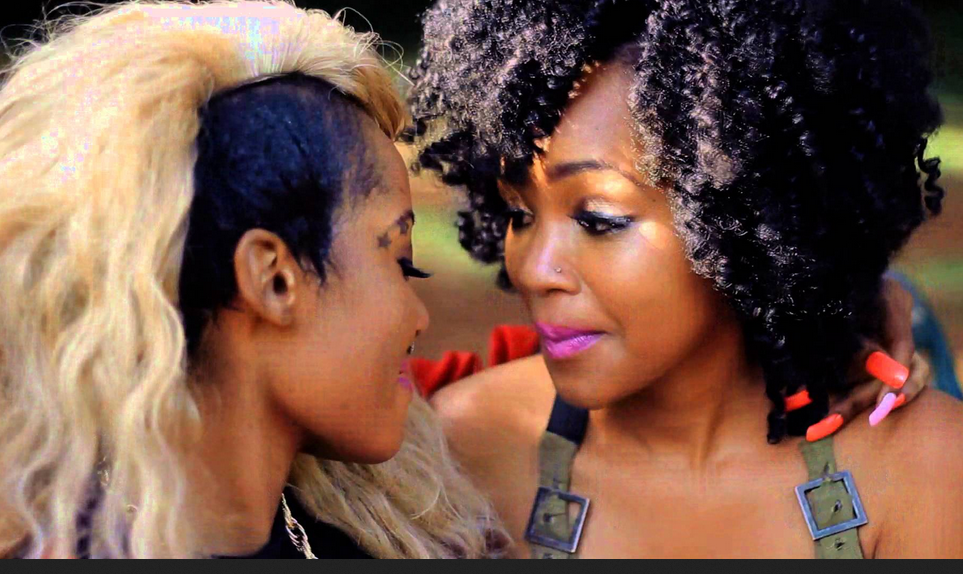
A screenshot of the YouTube video of Same Love (Remix).
During February 2016, the month of love, a group of artists from Kenya known as Art Attack released a music video called ‘Same Love (Remix), [1] a remix of Macklemore and Ryan Lewis’s Same Love. [2] The video symbolizes a call for Africans to eradicate homophobia. But for some Kenyans, it is considered inappropriate and immoral.
Same Love (Remix) video, which has gone viral, has over 2000 likes and 240,000 views on YouTube. It highlights different relationships of people of the same sex and the different challenges they face on a daily basis, ranging from public scrutiny to legal actions taken against them by some African governments.
The description of the song in the video reads: A Kenyan song about same sex rights, gay rights, LGBT struggles, gender equalities, gay struggles and civil liberties for all sexual orientations.
The video displays a warning which reads: This video contains imagery and a message that may be unnecessarily offensive to some.
Part of the lyrics say:
We come from the same corner, share the same pain,
stand up tall, it’s time for new laws not new wars.
The song also uses a verse on love from the Bible (1st Corinthians chapter 13) which emphasizes the value of love over other good human actions.
In an article titled ‘Ban On Sexy Music Video Raises Gay Rights Campaign Profile in Kenya,’ Anthony Langat describes [3] some scenes in the video:
(The video)…shows a well-toned young man, naked apart from his underpants, leaning over his tattooed male lover in bed.
Two pretty young women exchange kisses on a park bench, one putting a ring on the other's wedding finger, as the vocalist sings: “I can't change, even if I tried, even if I wanted to.”
The Kenya Film Classification Board has banned [4] the video arguing that “it does not adhere to the morals of the country.” The board unsuccessfully petitioned [5] Google to take the video down. Google said [6] that banning the video would be an infringement on freedom of expression. Under Google's rules [7], entities that wish to see a video removed from YouTube must make their case before a judge and submit to the company a court-issued document demanding the video's removal and confirming its illegality within the jurisdiction of the court.
The board went on to state that it did not issue a license of approval for the production of parts of the video that have been produced in Kenya and that any person found distributing the video on any platform shall be held liable in line with the law.
Same sex acts are illegal [8] in Kenya. The Constitution of Kenya does not expressly protect [9] the rights of homosexuals. However, article 27 states that [10]:
The State shall not discriminate directly or indirectly against any person on any ground, including race, sex, pregnancy, marital status, health status, ethnic or social origin, colour, age, disability, religion, conscience, belief, culture, dress, language or birth.
According to the International Lesbian, Gay, Bisexual, Trans and Intersex Association (ILGA) 2015 report titled “State-sponsored homophobia” [11], homosexuality is illegal in 34 African countries. South Africa is the only country in Africa where homosexuality is expressly protected by the country's constitution. Kenyan law also has no specific stipulations regarding representation of gay people in art or other forms of speech.
Despite homosexuality being illegal and considered a taboo in Kenya, the gay community is generally tolerated as there have been hardly any cases of stringent punishment as is the case in other African countries.
In 2014, Binyavanga Wainaina, Kenyan author, journalist and winner of the Caine Prize for African Writing, became the most high profile Kenyan to declare that he is a homosexual [12].
The ban of this particular video has left some people wondering why Western music videos on Kenyan radio and television stations talking about gay issues and relationships and other issues considered “un-African” are not banned.
Speaking last year during Obama’s visit, President Uhuru Kenyatta stated that [13] there are processes which take time and that currently it is a non-issue for Kenyans who have more pressing matters to deal with.
In October 2015, President Uhuru Kenyatta warned [14] against “witch-hunts” on homosexuals saying all Kenyans have a right to protection under the law.